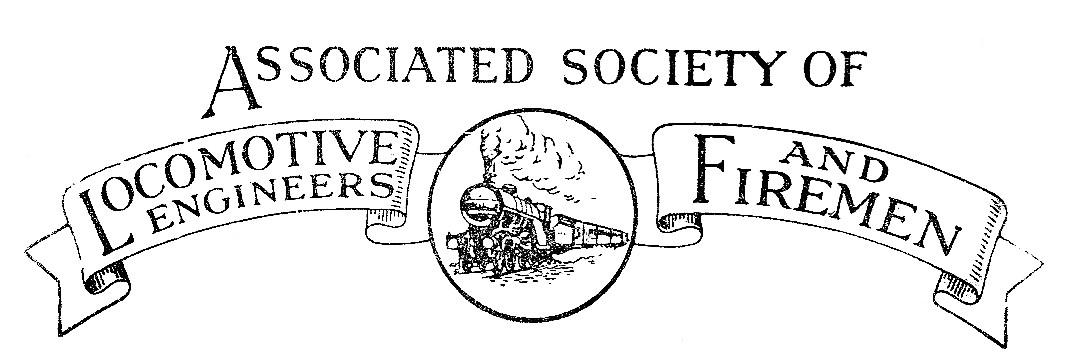
THIS WEBSITE, THE BRIGHTON BRANCH OF A.S.L.E.&F.
HAS NOW BEEN MOVED TO A NEW SITE CALLED
IGNITING THE FLAMING OF UNITY
http://ignitingtheflameofunity.yolasite.com/1919-lancing-works-strike.php
PLEASE CLICK ON THE IMAGE BELOW TO TRANSFER TO THIS NEW SITE
CLICK ON THE ABOVE IMAGE TO TAKE YOU
TO THE NEW UPDATED COMBINED AND WEBSITE
IGNITING THE FLAME OF UNITY WEBSITE
THIS WEBSITE COMBINES THE FOLLOWING WEBSITES
THE BRIGHTON A.S.L.E.&F., THE BRIGHTON MOTIVE POWER DEPOTS
& THE SUSSEX MOTIVE POWER WEBSITES
WHICH EXPLAINS THE EVOLUTION OF THE FOOTPLATE GRADES AND THE HISTORY OF THEIR TRADE UNIONS AND THE STRUGGLES TO IMPROVE THEIR WORKING LIVES
" This what they call Organization of Labour is the universal vital problem of the world. It is the problem of the whole future
for all who will in future pretend to govern men."—THOMAS CARLYLE.
THE LANCING CARRIAGE WORKS STRIKE
OF 1919
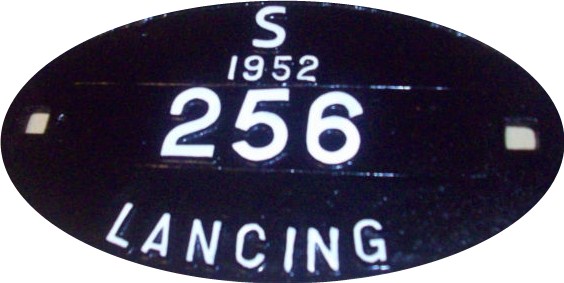
It is felt that this event needs to be included on this website, as it appears to have involved virtually every railwaymen at
Brighton and supported by the A.S.L.E.F. members of Brighton Loco
When the L.B.S.C.R. moved their Carriage Workshops from Brighton to Lancing in 1912, the move was resented by the vast
majority of the work force who continued to live within the Brighton area, and now had an additional railway journey from
Brighton to Lancing which added to their working hours.
|
On Monday 30th December 1918, saw the national hours’ week come into force under the railway agreement, work began at Lancing at 6 a.m. and the men had to catch a train leaving at 5.30. The day’s work finished at Lancing at 5.30 p.m. and they then had to make the return journey, Brighton being reached at 6.15. No pay was received for travelling time. A few months previous the men relinquished twenty minutes of their meal break time to enable them to reach home earlier, but continual agitation failed to achieve the request for the inclusion of the time spent in travelling into the number of hours for which payment was made. With the introduction of the 47 hours’ week it was decided to make a determined effort to secure these concessions. A notice setting forth their demand was posted on Monday and during the morning the Superintendent of the |
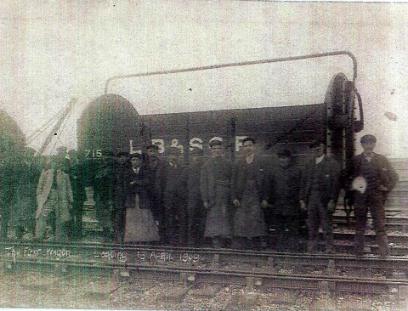 Andrea Thorne Collection |
Carriage Department, Mr. Panter was informed of their resolution. The Consequence of these alternations of hours was that
the Railway Company has provided a train at 7.30, instead of 5.30 as formerly to take men to Lancing. On Tuesday 31st
December 1918, the men decided that they would not travel by this train in future, and they resolved to present themselves at
Brighton Station on Wednesday morning at eight o’clock. This decision – of which Mr. Panter had been informed – was
carried into effect that morning, and on arrival at the station it was found that no train was awaiting them. Consequently none
of the men were at work during the day. In the course of the morning a Deputation waited on Mr. Panter at Lancing with a
view to arranging a join conference of the Carriage and Locomotive Departments, but no settlement of the dispute was
arrived at.
At night a crowded meeting of the Lancing employees, including women and boys, was held at Brighton, and the position was
discussed at considerable length. It was agreed to adhere to the decision already arrived at, and as necessary consequence, to
present themselves at Brighton Station at eight o’clock next morning. It was asserted that if no train was there would be a
strike on a large scale, affecting the Carriage and Locomotive Departments, and the running sheds at Brighton.
At eight o’clock no train was waiting, and accordingly at 8.30 the great majority of the workers at Brighton
joined the strikers.
On Thursday morning, 2nd January, a masked development of the Brighton Railway strike, as the men in the locomotive works
came out in sympathy with carriage department. They started work as usual this morning, but about half past eight the great
majority of the workmen put down their tools and joined the strikers, with nearly 2,000 men out on strike. A small section, in
number from about seventy to a hundred, remained at work until ten o’clock, and then they also struck, but stated that they
were under protest, as they did not consider they should be involved in the dispute
The total number of men out at mid-day was 3,280. The drivers and firemen and the station staff are not affected, and the
traffic so far proceeded as usual.
It was announced in the afternoon that the Joint Management of the Railway Shops had refused up to that time to meet the
representatives of the men to discuss the questions which had caused the stoppage of work.Some misapprehension appears to
have been caused by a statement in a London newspaper on Thursday 2nd, January, to the effect that the strikers demands
includes payment for travelling during the outward journey from Brighton to Lancing only, but the fact is – and it is not
disputed by the men themselves – that they are demanding that the whole of the time spent travelling shall be included in the
47 hours’ week. This is the primary cause of the trouble, but the men contend that they have other grievances, among which
are included the question of the wages of those engaged on piece-work, some of them complaining that they will be expected
to turn out in 47 hours’ week as much work as in the previous 54 if their earning are to be unaffected.
Against that it may be pointed out that when the claim for 47 hours’ week was conceded the unions affected gave a guaranteed that output should be in no way diminished, and in face of this it is a little difficult to reconcile that guarantee with the attitude of the men.
THE MEN'S OFFICIAL STATEMENT
On Friday morning, the men held another mass meeting on the Level in Brighton, and afterwards their Disputes Committee
met, and drew up the following statement of their case:-
“As considerable misunderstanding exists in the public mind, in connection with the present dispute affection some 3,000
railway employees on the L.B. & S.C. Railway system, mainly employed at Brighton and Lancing and likely to spread to the
whole system.”
The following is an authoritative statement issued by the Dispute Committee:-
The question at issue centres mainly around two points, which have arisen by the substitution of a 47 for a 54 hour week.
The first point of local importance is the claim of the men working at Lancing. They are asked to leave Brighton at 7.30 each
morning and get back to Brighton at 6.15 in the evening. The additional of an hour and a quarter to their daily task violates
both the letter and spirit of the 47 hour agreement.
The second point is of even greater moment, is a much as it touches a much larger section of the employees throughout the
system. Eighty per cent, of the shop-men are piece-workers and in the notice issued on Monday afternoon they are
peremptorily told that piece price will remain unaltered. Common-sense dictates that the logical outcome of this and its effect
on piece-workers will be reduction in wages of anything between 10s and 15s per week. Again a violation of the letter, and
spirit of the agreement, which is based on the principle, that the reductions in hours shall mean no diminution in wages. In
other words, as the men cannot produce as much in 47 as in 54 hours, an adjustment of prices is not only necessary but
imperative.”
At meetings other than those convened by the Dispute Committee have been addressed by irresponsibly persons, totally
unconnected with the Railway service, the Dispute Committee desire to take the opportunity of disclaiming any responsibility
for statements by them.
On the afternoon of Friday 3rd January, nine representatives of the men journeyed to London Bridge and had an interview
with the General Manner and other representatives of the company. The men were courteously received and the points in the
dispute were gone into seriatim in the course of a long discussion. No settlement was arrived at, but certain terms were
offered, and these were submitted to a mass meeting of the men Saturday morning, at the Duke of York’s Theatre, Preston
Circus.
Another grievance of the men is that they must turn out in the 47 hours’ week as much as in the 54 hours if their earning are to
remain unaffected.
At a mass meeting of the men on Saturday morning, 4th January, the representatives gave an account of the proceedings at
their interview with the General Manager on the previous afternoon and considerable discussion ensued on the terms of
settlement offered, but they were not regarded as satisfactory, and the meeting broke up without any definite decision being
arrived at. The prospect of an early settlement was not regarded as at all probable, and picket notices were posted at the
Labour Institute in Queen’s place.
There was a serious development on Sunday morning, 5th January, when the Brighton Drivers, Firemen and guards held a
mass meeting at the Duke of York’s Theatre, in Brighton, and it was decided to cease work at midnight on Monday in support
of the carriage department workers at Lancing. It was uncertain on Sunday as to the number of men affected, but it was
thought in labour circles that something favourable might be arrived to by Monday morning. Another meeting of railway-men
was held in the evening, in Croydon, whereby it was decided to strike next Friday, 10th January, if the Lancing dispute had
not been settled mean time.
On Monday morning 6th, however, there had been no stoppage of the traffic. How long this state of things will continue
remains to be seen. Careful inquiries go to show that the plane of the organisers of the strike have not works as was expected,
some men being told not to go to work and others receiving no message at all, with the result that traffic went on as usual.
It is understood that the good departments employees have decided to “come out” tomorrow, if the dispute is not ended.
At five o’clock the Conference between the Management and the Men was still in progress at London Bridge.
The situation in connection with the different Trade Unions was far from clear, while some branches had called upon their
members to leave their work for a sympathy strike, other have given explicit directions that their members are not to so, and
they are therefore continuing to work as normal. A call for general railway strike was ordered, with the railway workers at
Locomotive & Carriages Workshops at Crewe (L.N.W.R.) and Swindon (G.W.R.) to strike in support of their fellow railway
workers at Lancing.
During Monday afternoon there was a further conference are London Bridge between the representatives of the strikers at
Brighton and the management of the railway, but when the sitting terminated at 5.30. It was announced that there was nothing
to communicate for publication. Press representatives who saw Sir William Forbes who had gathered, at London Bridge
Station, however, that there was little or no prospect of the company undertaking to pay for the travelling time to and from
Lancing works. The hours at work have been reduced to 47 a week and the men have free railway conveyance to and from
their work. Thousands of men in other employments in London have to pay for long journeys from the suburbs out of their own
pockets, and have to be at their work at appointed working hours. “If you take the men’s argument,” Sir William Forbes is
reported to have, said, “The further a man lives from his work the happier he will be, and any man who lives a distance from
his work in London will be entitled to claim to book on from the time he joins his train, tram, or bus. It will be seen that the
Company cannot possibly make a concession.”
It is understood that questions regarding piece work applicable not merely to the Brighton Railway but to all parts of the
country coming under the 47 hours regulation, and other points are to be the subject at a general discussion between the
Companies and the Railway-men’s organisations.
On Tuesday morning 7th, the position in connection with the Lancing Railway dispute was much about the same as yesterday.
The rumour that the engine drivers and firemen would come out had not materialised: on the contrary it is understood that a
telegram was sent from London yesterday evening instructing them not to strike. Before that message was received about 50 of
the drivers and firemen had come out. This morning a large number of the men out on strike gathered at the Central Station
Square at Brighton and stood about chatting in groups for a long time.
Some of the guards, porters and ticket collectors, had joined the striker, but the station staff were to “carry on” working as
normal. With a section of the goods employers leaving their work “out of sympathy” with the workshop men, the goods traffic
had been interrupted, but, with a section of the men on duty, it had not been entirely stopped. Shunting and shifting of goods
was being continuing, and delivery also where tradesmen were able to arrange to fetch their consignments, but as the van men
were “out” the Company were not in a position to deliver off their own premises. The stable staff were at working attending to
the horses, so there has been no difficulty in that respect.
The situation in connection with the different Trade Unions is far from clear as while some branches have called upon their
members to leave their work for sympathy strikes, others have given directions that their members are not to do so, and they
are therefore continuing to work as usual.
A notice posted by the men’s dispute Committee at the Labour Institute this showing stated that the “position is most
favourable.”
|
It is understood that the goods departments employees have decided to “come out” tomorrow, if the dispute is not ended. At five o’clock the Conference between the Management and the Men was still in progress at London Bridge. One of the strikers’ delegates from the Brighton Strike Committee visited New Cross with the object of arranging a meeting of the employees at the Company’s chief locomotive department and securing a vote in favour of the strikers. So far as can be ascertained the New Cross men were not in favour of a sympathy strike, and they refused to meet for the purpose of discussing the idea. The delegate is stated to have then left for Battersea, where the other goods depot is situated and two New Cross representative followed in order to lay their points of view before their Battersea colleagues. The Brighton Strike Committee, had written to all their fellow A.S.L.E.F. Branches within the Brighton Company, with the view of trying to seek more support in their actions, but instead they all adhered to the instructions that was given by the A.S.L.E.F. Executive Committee and carried on working normally. The Executive committee did not support the actions of the Brighton Branch. |
PAUL EDWARDS COLLECTION Newhaven Branch of ASLEF Minutes of their Special meeting held on Wednesday 8th, January, 1919 |
|
|
|
|
REPLY TO SIR WILLIAM FORBES
The Dispute Committee at Brighton this morning formulated the following in reply to statements distributed in the press to the General Manager. The assertion of the Manager that the granting of the 47 hour week to the Lancing men was in the nature of a privilege outside the National Agreement is incorrect. In the agreements between the Railway Executive and the Railway Representatives of the National Unions concerned, the 47 hour week is granted without a conference to all shopmen, with a meeting , if necessary, to arrange details. This is a sufficient reply to the second compliant that the cessation of work took the Company by surprise. The 47 hour week was to come into operation on 1st January, 1919. The official notice intimating this to the men, were posted just one and a half days earlier. The Manager seems to forget that three weeks previously he had received a letter from the men asking for the meeting which the agreement states may be necessary to arrange details. The Committee asset that the Manager’s account of the removal of the Works to Lancing, true as far as it goes is not the whole truth. The removal of the men’s work eight miles from their homes was an act in which they were not consulted, and for which they bear no responsibility, and the Manager is sufficiently well acquainted with the details to be aware that between Brighton and Lancing, or at Lancing itself, no effort has hitherto been made to supply the necessary housing. It may seem a joke to the Manager that for six years the men have had to rise at 4.30 a.m. in order to be at work at 6, but they can assure him that they have never found any happiness in it. The proposal of leaving by train at 7.30 a.m. still involves rising at 6.30, with wives who have to prepare the meal getting up an hour earlier, and, much as the Manager makes of the absurdity of the men’s claim, it may surprise him to know that, in all its essentials, it is one that is at present practiced through the National Telephone system. The Manager assures the men and the public that such a strike cannot be tolerated by the Government. The difficulty the men are in is that experienced by “Poo-Bah” in the “Mikado.” It is hard to tell when the railway company is the Government or the Government is the Railway Company. Until Nationalisation of railways occurs (if ever), the railwaymen concerned are bound to regards the L.B. & S.C. Railway as their employers and to deal with them accordingly. |
|
|
|
On Wednesday, the situation at Brighton in connection with the Lancing Railway dispute had undergone little or no change this morning. Some of the Signalmen have come out in sympathy with the strikers, but not in any considerable numbers, and the passenger traffic is being carried on much as usual, One train to London and another to Portsmouth were cancelled this morning, but travellers had no difficulty in getting to their destination by earlier or later trains. As the strike had not been authorised by Union headquarters and the men came out on their own responsibility, they are not in receipt of strike pay. A large number assembled in the square at the Brighton Central Station, but there was no demonstration. During the morning there was |
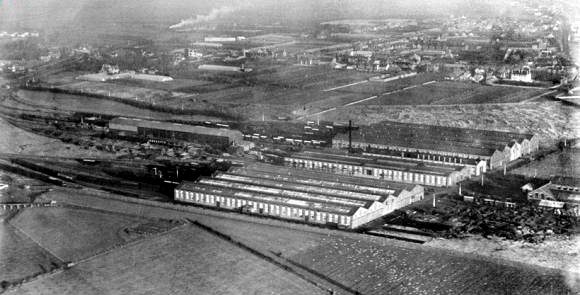 PHOTOGRAPHER UNKNOWN Lancing Carriage Works |
widespread are not in receipt of strike pay. A large number assembled in the square at the Brighton Central Station, but there
was no demonstration. During the morning there was a widespread rumour among the men that the Company were coping
with the situation by drafting workshop employees from other districts on the system into Brighton, but as a result of telegraph
enquiries, the Dispute Committee gave an assurance that there was no foundation for this.
The strike over the Lancing Carriage Works affair continues at Brighton. The Company have so far declined to entertain the
application of the men to be paid while travelling to their work from Brighton to Lancing and back. On their side the men are
also standing firm in the position they have taken up and so far there is a deadlock. The piecework rates, overtime and all
miner points stand, in accordance with the agreement between the men and their employers referred to a conference in
London of the Union headquarters representatives and these of the Joint Railway Management Committee. So far nothing has
been ensured as to the progress of this conference, and on enquiring this morning a representative of the Argus was informed
that the Depot Committee are still without any news of what had transpired there. The men have no local representative
attending it, but their interests are, of course being watched by the National Representative. Locally, the position shows very
little change from yesterday. Passenger traffic is still being carried on; the only train cancelled being the 6.55 to Portsmouth
this morning.
MESSAGE FROM SIR W. FORBES ANSWERING TO MEN’S QUESTIONS
In Tuesday Brighton's Evening Argus, there was published an official statement on behalf of the men on strike from Lancing
Railway Works in reply to assertions in the press attributed to Sir William Forbes General Manager of the London and
Brighton Railway. Yesterday evening the following notice to reply was reply from the General Manager’s office:-
"With reference to the statement in your paper today, made on behalf of the men on strike, evidently some serious
misunderstandings of the facts has crept in, and it is, therefore, all the more to regretted that the men, as the General Manager
has already stated, only raised their claim to be pad for travelling on Tuesday evening, and went out on strike the following
morning, without giving the General Manager an opportunity of meeting them. Hitherto excellent relations between the
company and its employees have been maintained by meeting and discussing grievances before any drastic action has been
takes."
The following are the facts: - The first intimation that the 47 hour week asked for by the Federation of Engineering and
Shipbuilding Trades and the Amalgamated Society of Engineers was to be applied to the Carriage and Wagon shops at Lancing reached the Brighton company’s Headquarters on Saturday, 28th December, in a circular letter from the Railway Executive Committee dated the 27th of December. The intimation was immediately conveyed to all Departments concerned,
and a notice was posted up on the following Monday afternoon.
There was no mention in the circular letter of any claim by the men to be paid for the hours occupied travelling to and from
the works. On the contrary, it was definitely stated that all existing conditions of service were to be maintained pending
further negotiations with the Trade Unions.
A letter three weeks previous was sent from the men unions, to the General Manager, who acknowledge this letter, and said the
matter should have attention, but he was unable to deal with the points raised until after definite instructions from the Railway
Executive Committee that it had been agreed that the 47 hours per week was to be applied to railway shops had been received and, as stated above, this intimation was only received on Saturday 28th December. There was no mentioned of any claim to
be paid for the time occupied for travelling in the said letter. It is true that the men were not consulted as the removal of the
works from Brighton to Lancing. It was quite impossible to build the works at Brighton, and the very nearest site was chosen,
namely Lancing. It is only half-a-hour’s run from Brighton, and thousands of workmen in London and elsewhere have a much
longer and much more tedious journey to get to and from their work.
MR. J.H. THOMAS EMPHATIC WARNING MEN AT WORK NOT TO FOLLOW STRIKERS
Mr. J.H. Thomas, M.P., General Secretary, National Union of Railwaymen to a statement to the Press Association this
morning said his attention had been called to the circular issued on his behalf of the Brighton Strike Committee calling upon
on railwaymen and others to strike in support of the men now out.
Mr Thomas said he wished to give the most emphatic warning to the members against following say such advice.
The Executive Committee had discussed the matter with the Board of Trade and Sir William Forbes, and suggestions were
made which in the opinion of the Committee ought to result in the men’s immediately resuming work.
Mr. Thomas“I must,urge the men to recognise that the present state of the country it is imperative that stoppages shall be
avoided. Everything is being done by the Executive Committee to speed up the matter, but there must be a real desire to make
tings run smoothly."
The men held a extraordinary meeting this morning at the Dukes of York’s Theatre, Preston Circus, and the Dispute
BRIGHTON RAILWAYMEN TO RESUME WORK
FOUR POINTS TO BE ARBITRATED
All the men affected by the Brighton Railway strike will be at work on Monday 12th January.
This decision was arrived at a mass meeting at on Saturday, morning, 10th, at the Duke of York’s Theatre, Brighton, and this
morning. A member of the Dispute Committee presided, and the following resolution was unanimously carried: - “That-we
submit the questions at large to the Railway Executive and the representative of the National Union involved for arbitration.”
The questions at hand are:-
1. The inclusion of travelling time in the 47hour week.
2. The resolution of piece–work price to need the condition of the 47 hour week.
3. Overtime.
4. The question of watchmen, gatemen and all men of this type who will still be required to work a 12 hour day.
Following the meeting at the Duke of York’s Theatre, a conference was held at the Railway Company and of the men. After a
long deliberation the following was drawn up and signed by both parties: - “It is agreed that the men on strike resume work
immediately, without prejudice to either side.”
These questions could not be altered except by and through negotiations between the Railway Executive, the Ministry of
Labour and the national representatives of the men’s Union. The questions of the arrangements for the 47 hour week to
Brighton i.e. the starting and stopping times each day, and particularly the question of the stopping time on Saturdays, were
part of this settlement.
The Dispute Committee has given an undertaking that all the men here will be at as arranged, the whole of the 3,000
employees of the locomotive and carriage building shops of the London and Brighton Railway who had been out on
strike in connection with the 47 hour working arrangements arrangement, resumed work on Monday morning. Good
feeling was apparent all round, and, judging from the demeanour of the men, the majority were pleased to be able to
return to duty.
There is a lot of work to be performed in these departments between now and Easter in repairs and renewals of rolling
stock preparatory to the increased train services in the spring and summer. In ordinary times, the winter months are fully
occupied with such occupations, but the war influences have imposed severe limitation during the past two years, and
the loss of time consequent upon the strike has not improved the situation.
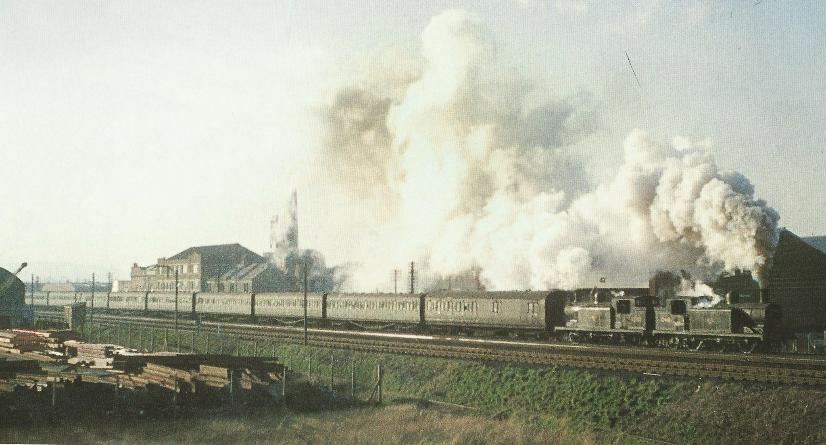
"THE LANCING BELLE"
The works train between Brighton and Lancing continued to run after the Strike gaining the nickname “The Lancing
Belle” by the workforce after the other famous named train out of Brighton “The Brighton Belle”.
This train would stop at principal stations between Brighton and Lancing in the morning but on the return in the evening
would only slow down enough to let the workman jump off.
This train remained one of the last Steam Workings out of Brighton Shed right up until the end of Steam on the Central
Division June 1964. On Monday, 15th June, 1964, the Brighton - Lancing Works workmen's train, 'The Lancing Belle’
became diesel hauled by a Type 3 locomotive (class 33). The diesel haulage was to be brief, with the last working into the
Works running on July 3rd1964. The service was replaced by a straight forward set of electric stock working between
Brighton & Lancing station.
|
The works continued to operate after the nationalisation of British Railways (BR) in 1948 and gained a reputation for its efficiency and industrial harmony. By the 1960s over 1,500 employees worked at Lancing. In 1962 efforts to rationalise BR's manufacturing capacity resulted in the decision to close Lancing in favour of Eastleigh Railway Works. Many of those concerned felt the decision to close Lancing rather than Eastleigh was for political rather than economic reasons, due to Eastleigh being a marginal Parliamentary constituency in the 'sixties that the Government of Harold Macmillan was fearful of losing, whilst Lancing fell within a 'safe' Conservative Parliamentary seat. The run down of the carriage works took place over the next three years, with final closure coming on 25 June 1965, with the loss of over 1,500 jobs. Right the last carriage to leave Lancing Works Andrea Thorne Collection |
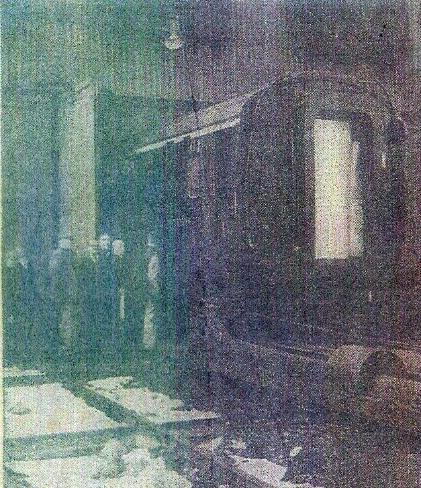 |
THE BRIGHTON BRANCH OF A.S.L.E.&F. WEBSITE.
HAS NOW BEEN MOVED TO A NEW SITE CALLED
IGNITING THE FLAMING OF UNITY
https://ignitingtheflameofunity.yolasite.com/
PLEASE CLICK ON THE IMAGE BELOW
TO TRANSFER TO THIS NEW SITE
CLICK ON THE ABOVE IMAGE TO TAKE YOU
TO THE NEW UPDATED COMBINED AND WEBSITE
IGNITING THE FLAME OF UNITY WEBSITE
https://ignitingtheflameofunity.yolasite.com/
THIS WEBSITE COMBINES THE FOLLOWING WEBSITES
THE BRIGHTON A.S.L.E.&F., THE BRIGHTON MOTIVE POWER DEPOTS
& THE SUSSEX MOTIVE POWER WEBSITES
WHICH EXPLAINS THE EVOLUTION OF THE FOOTPLATE GRADES AND THE
HISTORY OF THEIR TRADE UNIONS AND THE STRUGGLES TO IMPROVE
THEIR WORKING LIVES
CLICK ON THE ABOVE IMAGE TO TAKE YOU
TO THE NEW UPDATED COMBINED AND WEBSITE
IGNITING THE FLAME OF UNITY WEBSITE
https://ignitingtheflameofunity.yolasite.com/
THIS WEBSITE COMBINES THE FOLLOWING WEBSITES
THE BRIGHTON A.S.L.E.&F., THE BRIGHTON MOTIVE POWER DEPOTS
& THE SUSSEX MOTIVE POWER WEBSITES
WHICH EXPLAINS THE EVOLUTION OF THE FOOTPLATE GRADES AND THE
HISTORY OF THEIR TRADE UNIONS AND THE STRUGGLES TO IMPROVE
THEIR WORKING LIVES
